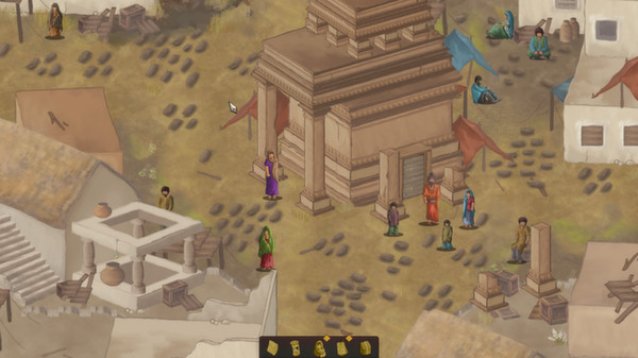


You’re not going to play a whole lot of games in 2014 that will give you varying perspectives on events. You’re always just the one white dude, and you only get to see how things go down from his angle. I always like it when games stray from that standard, showing viewpoints from all over like most other fiction does. The distinctly non-traditional RPG Unrest dares to tell its story that way, and it works to tremendous effect.
Set in a fantastical version of historic India called Bhimra, Unrest has you take control of several characters who are living through a period of, well, unrest involving famine, a trade agreement with foreign lizard people gone wrong and the rule of oppressive leaders. It’s a complicated situation, and the game treats it as such, rather than something the player can sort of glide through and still “win” (coughMass Effectcough).
During the game you’ll see all the angles, from that of a teenage peasant girl set up with a really awkward arranged marriage to the young daughter of Bhimra’s rulers, to a priest working under a religious leader who is generally considered to be a despot. Each chapter serves as a semi-contained narrative in which you basically walk in their shoes for a day, experiencing their lives in what amounts to very deep role playing.

You’ll speak with folks, argue with them, help them and so forth, all as you do what you can to survive in this struggling world which is never sympathetic to you. Unlike Gods Will Be Watching, which carried a “what will you do to survive” take on morality, Unrest gives you the chance to be noble -- it’s more about whether you’ll look out for yourself or try to benefit those around you.
And it’s never cut and dry the way that description might make it sound. Sometimes taking a principled stand doesn’t really benefit anyone at all, and on other occasions you might think you’re doing good but later realize you made a big mistake.
That’s all great and very interesting, but the real capper, and what turns Unrest into the thoroughly compelling experience that it is, is the perspective shifts. Things are not always as they seem, and instead of showing you that in the normal video game “twist” way it just moves you over to the other side to experience their situation more naturally. It’s about like reading a dynamic novel, and one far more nuanced and complex than an old Choose Your Own Adventure book or your average Japanese visual novel.
As enthralling as it can be, Unrest still feels like a bit of a tough nut at points because of the combination of its lack of voice acting and occasional wordiness. Not that either of those things is inherently a flaw, but bringing the two together in a game you have to play on a computer can inspire some zone-out moments in the player or make it a bit of a struggle to play beyond small chunks. I’ve developed a personal preference for playing this visual novel-ish type of game on a handheld like the Vita or even a tablet, so even while I was enthralled with Unrest my sessions were all short in comparison with my normal gaming habits. I had this same issue earlier this year with the similar title Always Sometimes Monsters.

But that does in the big picture feel like a small complaint because there’s really nothing wrong with only playing a chapter or two at a time. And the hooks are so great that my quibbles seem unimportant even to me. Unrest, being a game containing profound insight just through its structure, is a must-play regardless of any qualms I may have about my distaste for playing these more relaxed experiences on my television.
I love it. Unrest is another indie that exposes the lie of AAA that says games need some physical skill element to be worthwhile. It gives us many layers to ponder with its narrative, wrapped in a package that feels culturally relevant even as it’s firmly rooted in a past and culture that is not my own. That, my friends, is something worth experiencing.
9 out of 10
Unrest was developed by Pyrodactyl. It was released on July 23, 2014, and is available on PC and Mac for $14.99. A copy of the game was provided to the author for the purposes of this review.




 Witcher 3: Hearts of Stone - How to Use Runewords and Glyphwords
Witcher 3: Hearts of Stone - How to Use Runewords and Glyphwords How to Find Out the Exact Date You Created Your Gmail Account
How to Find Out the Exact Date You Created Your Gmail Account Shannon Lee confirms New Bruce Lee biopic is in the works
Shannon Lee confirms New Bruce Lee biopic is in the works Mind Blown: 40 Final Fantasy Secrets & Facts
Mind Blown: 40 Final Fantasy Secrets & Facts Alienware Alpha Review And Giveaway
Alienware Alpha Review And Giveaway